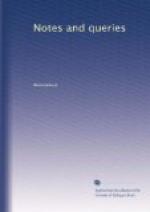“A TREATISE OF EQUIVOCATION, wherein is largely discussed the question, whether a Catholicke or any other person before a Magistrate being demaunded uppon his oath whether a Prieste were in such a place, may (notwithstanding his perfect knowledge to the contrary), without Perjury, and securely in conscience answere, No: with this secreat meaning reserved in his minde, That he was not there so that any man is bound to detect it.”
The words in small capitals and Italics occupying the first two lines are crossed out, and “whe-,” the first syllable of whether, re-written at the beginning of line 3. At the end of this title, interlined by another hand, follow the words “newly, overseer ... ignorants;” but these words are also struck through and re-written on the preceding leaf, on which, written by the same hand by which the interlineation was made (Garnet’s, as it would seem), the title stands,—
“A Treatise of
against Lying and fraudulent Dissimulation.
Newly overseen by the Authour,
and published for the defence of
Innocency and for the Instruction
of Ignorants.”
The “of”, in Italics, is struck out. The MS. has other corrections throughout in the same (Garnet’s) hand; and was evidently prepared for the press, as Blackwell’s imprimatur implies.
I have to apologise for some incorrect dates in my last communication.
J.B.
* * * * *
BOETHIUS’ CONSOLATIONS OF PHILOSOPHY.
The celebrated treatise De Consolatione Philosophiae, was translated into English verse by John Walton, otherwise called Johannes Capellanus, in the year 1410. A beautiful manuscript on parchment, of this translation, is preserved in the British Museum (Harl. MS. 43.). Other copies are amongst the archives of Lincoln Cathedral, Baliol College, &c. It was printed in the Monastery of Tavestok in 1525, a copy of which impression is of the utmost rarity. There is an English prose translation by “George Colvil, alias Coldewell,” printed by John Cawood, 4to. 1556. And again, Boethius’ Five Bookes of Philosophicall Comfort, translated by J.T., and printed at London in 12mo., 1609.
Viscount Preston’s translation was first printed in 8vo., 1695. The edition of 1712, mentioned by your correspondent, was the second. Boethius was again translated by W. Causton in 1730, and with notes and illustrations, by the Rev. P. Ridpath, 8vo., 1785. The latter is, I believe, an excellent translation; it is accompanied by a Life of Boethius, drawn up with great care and accuracy. In 1789 a translation by R. Duncan appeared at Edinburgh; and in 1792, an anonymous translation was printed in London. The latter is said to be a miserable performance.
King Alfred’s Anglo-Saxon version, with an English translation and notes, by J.S. Cardale, was printed at London, in 8vo., 1829.




